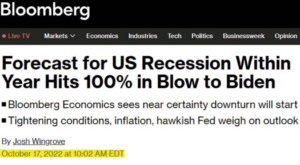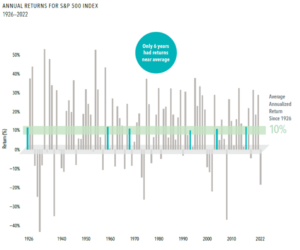Details Are Part of Our Difference
Embracing the Evidence at Anheuser-Busch – Mid 1980s
529 Best Practices
David Booth on How to Choose an Advisor
The One Minute Audio Clip You Need to Hear
Category: Philosophy
Why Presidential Elections Don’t Really Matter for Your Stock Market Return
Every four years, the United States gets consumed by the frenzy of presidential elections. It’s everywhere: TV, social media, and the minds of investors. Whether you’re on Main Street or Wall Street, the speculation about how the market will react to the latest poll or debate is impossible to escape. But there’s a simple truth that often gets lost in the noise—which political party is in office has little effect on the stock market.
For all the headlines and heated debates, historical data tells a clear story: a 60/40 portfolio has delivered average annual returns of around 8%, regardless of which party holds the White House. On top of that, election years are no different from non-election years. Although stock markets can show volatility during election years, and that can be uncomfortable, it doesn’t tell the whole story. Market returns during election years have also historically averaged 8%.
One of the most important lessons for long-term investors is that reacting to short-term political news is rarely a good idea. Trying to time the market based on election outcomes can lead to costly mistakes. Studies consistently show that missing just a few of the market’s best days—many of which often come after periods of volatility—can dramatically reduce your long-term returns.
For example, take this headline from Bloomberg back in 2022 predicting a 100% chance of a US Recession within a year.

For those keeping score the S&P 500 is up 61% as of 9/30/24 since that article came out.
Instead, the better course of action is often to stay invested. The stock market is priced at positive expected returns. In other words, over the long run, stocks are expected to grow in value. The market’s historical average return of 8% reflects this.
If you stay invested through election cycles, avoiding the temptation to sell or make drastic changes based on who wins or loses, you’re more likely to capture those long-term returns.
Whether it’s a blue wave, a red surge, or a contested result, research shows none of it changes the fundamental rules of investing. Stick to your plan, and let time—and the market’s resilience—work in your favor. Presidential elections come and go, but the market’s ability to deliver positive long-term returns remains.
Hill Investment Group is a registered investment adviser. Registration of an Investment Advisor does not imply any level of skill or training. This information is educational and does not intend to make an offer for the sale of any specific securities, investments, or strategies. Investments involve risk, and past performance is not indicative of future performance. Consult with a qualified financial adviser before implementing any investment or financial planning strategy.
The True Value of Advice: Beyond the Numbers
At Hill Investment Group, we believe in helping our clients take the long view when it comes to their financial well-being. But what does that mean in practice? It’s about more than just numbers; it’s about finding strategies that improve your financial outcomes and give you peace of mind.
Quantifying the Impact of Financial Advice
Several research studies have attempted to quantify the value of good financial advice. Vanguard estimates the impact at up to 3% per year, calling it “Advisor’s Alpha.” Morningstar refers to it as “Gamma,” measuring it at 1.59% per year for retirees. While the terminology may differ, the consensus is clear: thoughtful, evidence-based financial advice can significantly enhance your financial outcomes over time.
At Hill Investment Group, we believe this value goes beyond just dollars and percentages. It’s about guiding you through market fluctuations, life changes, and financial decisions with a steady hand, always focusing on the big picture.
The Behavioral Factor: Turning Plans into Action
One of the most overlooked benefits of working with a financial advisor is ensuring that the plan actually gets implemented. Most people know they should save more, spend wisely, and avoid emotional investing decisions, but turning intention into action is another matter entirely. This is where Hill Investment Group comes in—providing the support, coaching, and accountability needed to take the long view and stay the course.
The “Compared to What” Problem
Measuring the value of financial advice isn’t straightforward. It’s one thing to compare two specific strategies and determine which is better. It’s another to assess how much value a financial planner adds in the abstract, especially when we can’t know how someone would have behaved without the advice.
For example, a strategy that maximizes wealth might not be best if it leaves you feeling anxious about potential losses. What truly matters is how well a strategy aligns with your goals and risk tolerance. A financial plan that looks perfect on paper might not be ideal if it keeps you up at night. At Hill Investment Group, we focus on strategies that not only work on spreadsheets but also fit seamlessly into your life.
More Than Just Portfolio Management
Financial advice goes beyond portfolio management. It touches on various areas like tax planning, insurance, estate planning, and retirement strategies. And while some benefits, like tax savings from effective asset location, are easier to quantify, others, like peace of mind from knowing your financial house is in order, are invaluable.
The Bottom Line
At Hill Investment Group, we believe that the true value of financial planning is not just in the strategies recommended but in their execution and alignment with your personal goals. It’s not just about achieving higher returns or paying less in taxes—it’s about living a life where your finances support your well-being and aspirations. That’s the essence of taking the long view.
The Bumpy Road
Historically, the US Equity market has returned about 10% annually to investors from 1926 – 2022. Due to this historical rate of return, many investors expect this level of return year over year. However, stock markets are highly volatile. Although the average is 10% per year, it is extremely rare for the market to be up 10% over any given year.

Since 1927, there have only been 6 years where the stock market returned between 8-12%. Thus, even though you should expect the market to give you a 10% return, you should expect the market over any given year to hardly ever give you a 10% return. It is this bumpy road that creates the risk in investing in equities, which is why you are compensated with the 10% annual average return. The key is to take the long view and not look at quarter-to-quarter or year-to-year returns.
People often panic when their expectations don’t match reality. Investors expect a 10% return every year, which will often not materialize. When the market goes down and does not match this 10% expectation, investors tend to panic. Changing your expectations on the range of outcomes of equities while keeping in mind the long-term average can help investors stick to their plan.
Hill Investment Group is a registered investment adviser. Registration of an Investment Advisor does not imply any level of skill or training. This information is educational and does not intend to make an offer for the sale of any specific securities, investments, or strategies. Investments involve risk, and past performance is not indicative of future performance. Return will be reduced by advisory fees and any other expenses incurred in managing a client’s account. Consult with a qualified financial adviser before implementing any investment strategy.
Hill Investment Group may discuss and display charts, graphs, and formulas which are not intended to be used by themselves to determine which securities to buy or sell, or when to buy or sell them. Such charts and graphs offer limited information and should not be used alone to make investment decisions.

